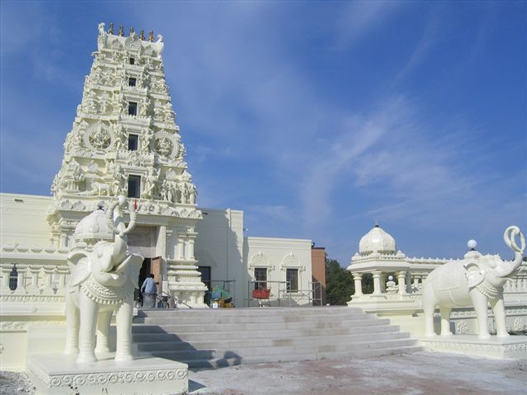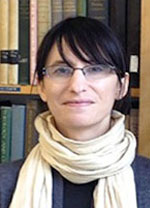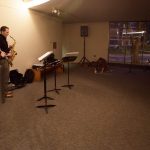Professor Knepper’s Spring 2105 Philosophy of Religion course looked at discourses of ineffability in Jewish mysticism and Muslim mysticism (as well as a little Zen Buddhism). In their final papers students were asked to describe and compare several of these discourses, then both to explain their commonalities and differences and to evaluate the general claim that ultimate beings and/or experiences are ineffable. Below are some of their final papers:
04/30/2015: Concluding Comparisons
Tim Knepper and Leah Kalmanson,
Directors of The Comparison Project, Drake University professors of philosophy and religion.
April 30, 7 p.m., Sussman Theater, Olmsted Center
In the final event of its 2013-2015 series on “religion beyond words,” The Comparison Project’s directors, Tim Knepper and Leah Kalmanson, will compare over the programming of the last two years, raising philosophical questions of meaning, value, and truth about ineffability in comparative religious perspective. Knepper and Kalmanson will explore the diversities of ineffability in nine religious traditions as well as the arts and literature, focusing on the distinctive means by which humans speak about things they say cannot be spoken. Ultimately, Knepper and Kalmanson will also assess the ends toward which ineffability has been deployed in the practice and study of religion.
Timothy Knepper is associate professor of philosophy and religion at Drake University. He teaches and publishes in the philosophy of religion, comparative religion, late ancient Neoplatonism, and mystical discourse. He is the author of books on the future of the philosophy of religion (The Ends of Philosophy of Religion, Palgrave, 2013) and the sixth-century Christian mystic known as Pseudo-Dionysius the Areopagite (Negating Negation, Wipf & Stock, 2014).
Leah Kalmanson is Assistant Professor of Philosophy and Religion at Drake University. She researches and teaches in the fields of Asian and comparative philosophy, continental philosophy, and postcolonial theory. She has published the co-edited volumes Confucianism in Context (SUNY 2010), Levinas and Asian Thought (Duquesne 2013), and Buddhist Responses to Globalization (Lexington 2014).
*Note about Kalmanson’s presentation: Kalmanson is indebted to works by Tomoko Masuzawa and Jason Ānanda Josephson (listed below) for her discussion of the history of the term “religion” in Europe. Her quotations in the Hakuseki-Sidotti exchange are taken (at times with slight modification) from the Josephson source.
- Josephson, Jason Ānanda. The Invention of Religion in Japan. Chicago: University of Chicago Press, 2012.
- Masuzawa, Tomoko. The Invention of World Religions: Or, How European Universalism Was Preserved in the Language of Pluralism. Chicago: University of Chicago Press, 2005.
04/16/2015: Love Is to Renounce Naming the Beloved: Muslim Mystic al-Rabi’a and Her Teaching of the Ineffable
 Tamara Albertini,
Tamara Albertini,
Professor of Philosophy, Director of the Undergraduate Certificate of Islamic Studies, University of Hawai’i at Manoa
April 16, 7 p.m., Sussman Theater, Olmsted Center
The female Muslim mystic Rabi’a al-‘Adawiyya (d. 801) is widely considered one of the most influential mystics of Sufism, as she was primarily responsible for redirecting the spirit of early Sufism away from the path of austere asceticism and toward the path of divine love. Dr. Albertini’s illustrated lecture will begin by introducing Sufism in general and Rabi’a in particular, after which she will explore Rabi’a’s mystical poetry with respect to her struggle to express an ineffable love for Allah.
Dr. Tamara Albertini was raised in North Africa where she learned Arabic and attended Qur’anic classes. Later, she obtained a Lic.phil. from the University of Basel (Switzerland) and a Dr.phil. from the Ludwig-Maximilians-Universität in Munich (Germany) in Islamic and Renaissance studies. Her many publications aim at reintroducing the vigor and vision of Muslim intellectual contributions from the classical period. Since 9/11, she speaks widely on Islamic Fundamentalism, Women and Islam, and Islamic Law.
02/26/2015: Kabbalah, Language, and Transcendental Mysteries

Steven Katz,
Alvin J. and Shirley Slater Chair of Jewish and Holocaust Studies, Boston University
Feb. 26, 7 p.m., Sussman Theater, Olmsted Center
The Jewish mystical tradition, like all mystical traditions, has had to deal with the issue of language and the communication of mystical experience. In responding to this basic issue, Jewish mystics did not emphasize ineffability. Instead, they answered the conceptual matters raised by the challenge of language by creating a theology that drew on the material in, and the interpretation of, the Hebrew Bible.
Dr. Katz serves on the Academic Committee of the U.S. Holocaust Memorial Museum, chairs the Holocaust Commission of the Memorial Foundation for Jewish Culture, and serves as Academic Adviser to the 31 countries that make up the International Holocaust Remembrance Alliance. He has published numerous works on the Holocaust and Jewish philosophy as well as five seminal books on comparative mysticism all from Oxford University Press.
Listen to audio of Katz’s lecture:
[sc_embed_player_template1 fileurl=”http://comparisonproject.wp.drake.edu/wp-content/uploads/sites/92/2015/02/KatzLecture.mp3″]
02/12/2015: The Sayings and Missayings of Samuel Beckett
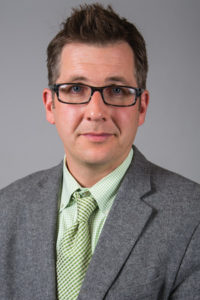 Craig Owens, Associate Professor of English, Drake University
Craig Owens, Associate Professor of English, Drake University
February 12, 7:00 p.m., Sussman Theater, Olmsted Center
The narrators of Samuel Beckett’s novels and the characters in his plays fill their worlds with words. In his final trilogy of novels, Nowhow On, these utterances become intensely self-reflective, so much so that they are about uttering itself, the signifier’s inability to bear transparently its signified content. Ineffability, here, emerges not as the failure of a particular kind of signified content, but as the failure of signifiers themselves ever to refer to an extra-symbolic signified in the first place.
Craig N. Owens teaches modern drama, playwriting, modern Irish and British literature, and discourse and language theory. He has directed and performed in many of Beckett’s plays.
Listen to audio of Owen’s lecture and a response from Gereon Kopf, Professor of Religion, Luther College
[sc_embed_player_template1 fileurl=”http://comparisonproject.wp.drake.edu/wp-content/uploads/sites/92/2015/02/owens_lecture.mp3″]
Photos from Performing Ineffability: Art, Poetry, Music
11/07/2014: Exhibitions on Art and Ineffability

Drake University’s Comparison Project hosts two exhibitions on art and ineffability during the month of November with opening events on Friday, November 7. The opening events feature poetic and musical performances of ineffability from 5:00 to 6:00 p.m. in Weeks Gallery, a gallery talk on contemporary abstract painting as a form of wordless communication at 6:15 p.m., and a concert by the jazz sax quartet New Third Stream Quartet at 7:30 p.m. in Sheslow Auditorium.
Everday Abstraction in the Anderson Gallery is an exhibition of contemporary abstract painting as a form of wordless communication. It features the paintings of five artists from across the United States. It will be on view through January 23, 2015. Visit the Anderson Gallery website for more information.
Weeks Gallery will display works by various artists, all of whom are responding to the theme of “ineffability” through painting, photography, sculpture, and mixed media projects. The exhibition entitled, Performing Ineffability: Art, Poetry, Music will remain on display through the end of November. An associated art installation in Scott Chapel will be on display from November 5 to 7.
Two of the poet-artists involved in the exhibition opening are also participating in events on Thursday, November 6. At 6:00 p.m. Christopher Janke lectures on ineffability in contemporary poetry, and at 7:30 p.m. Douglas Kearney performs from his recent work Patter and hosts readings from Drake’s Coalition of Black Students and Des Moines’s Run DSM. Both poetry events will be held in the Cowles Library Reading Room.
All events are free and open to the public.
11/06/2014: Using a Net to Catch the Air: Poetry, Ineffability, and Small Stones in a Shoe
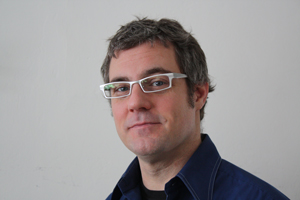 Christopher Janke, Independent Poet and Artist
Christopher Janke, Independent Poet and Artist
Thursday, November 6, 6:00 p.m.
Cowles Library Reading Room
Using a Net to Catch the Air: Poetry, Ineffability, and Small Stones in a Shoe is a free-form lecture—a meditation—on the way certain poets create aesthetic experiences by simultaneously constructing and undermining their own linguistic creations.
Christopher Janke explores the connection between words and the world with sculptural poetics. His poems have been in Harper’s, The American Poetry Review, and dozens of other journals. His first book, Structure of the Embryonic Rat Brain, won the Fence Modern Poets Series Prize; a two-volume set of poetry, Blink Song, is due out from H_NGM_N Books in 2015.
Christopher Janke’s lecture manuscript
Listen to audio of Janke’s lecture:
[sc_embed_player_template1 fileurl=”http://comparisonproject.wp.drake.edu/wp-content/uploads/sites/92/2014/11/Janke_lecture.mp3″]
10/09/2014: “That From Which All Words Return”: The Distinctive Methods of Language Utilization in Hinduism’s Philosophical Tradition of Advaita Vedanta
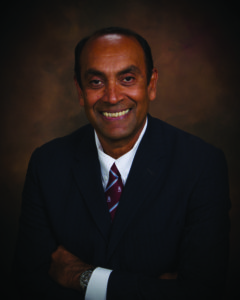 Lecture by Anantanand Rambachan, Professor of Religion, St. Olaf College
Lecture by Anantanand Rambachan, Professor of Religion, St. Olaf College
Thursday, October 9, 7:00 p.m., Sussman Theater, Olmsted Center
Advaita is a non-dual Vedānta tradition within Hinduism, based on an exegesis of the
Upaniṣads, the final sections of the Vedas. Its principal systematizer and exponent is Śaṅkara (ca. 8th CE). Advaita regards the words of the Upanṣads as a valid source for our knowledge of the limitless (brahman). Speaking about brahman, however, is challenging. Brahman is not one object among other objects and is not available for observation through objectification. It possesses none of the characteristics through which words are usually able to describe a subject. Advaita offers a skillful mode of instruction about brahman, employing finite word-symbols to speak of the infinite. This lecture will consider this predicament and the methods employed in the texts and tradition to deal with the limits of language.
Anantanand Rambachan is Professor of Religion at Saint Olaf College, Minnesota, where he
has taught since 1985. His books include, Accomplishing the Accomplished: The Vedas as a
Source of Valid Knowledge in Śaṅkara, The Limits of Scripture: Vivekananda’s Reinterpretation of the Authority of the Vedas, The Advaita Worldview: God, World and Humanity, and A Hindu Theology of Liberation: Not-Two is Not One. The British Broadcasting Corporation transmitted a series of 25 lectures on Hinduism by Professor Rambachan around the world.
Download Rambachan’s Powerpoint Presentation
09/18/2014: When Expression Is Expressed, Non-Expression Is Not-Expressed: A Zen Buddhist Approach To Talking About The Ineffable
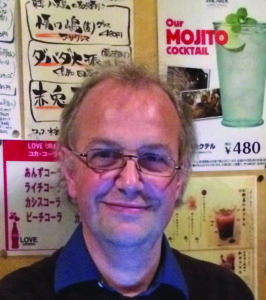 Thursday, September 18th, 7:00 p.m., Sussman Theater, Olmsted Center
Thursday, September 18th, 7:00 p.m., Sussman Theater, Olmsted Center
Lecture by Gereon Kopf, Associate Professor of Religion, Luther College
Philosophy of religion as developed in the monotheistic traditions of Christianity and Islam explores the question as to if/how it is possible to talk about and predicate God. One of the answers to this question is negative theology, which claims that any predication of God in positive terms is impossible.The religious philosophies developed in the Zen Buddhist tradition has often been accused of rejecting any linguistic description of the absolute. While the rhetoric of silence is rather pervasive among Zen thinkers, it is often accompanied by a solid philosophy of language and even, to use a contemporary term, signification. Some Zen thinkers even go so far as to suggest that linguistic discourses on the absolute are not only possible but also necessary. One of them is the medieval Japanese Zen master Dōgen. To Dōgen language is one of the many possible ways to “express” and “manifest” what we call the “divine.” This talk will explore Dōgen’s philosophy of “expression” and suggest a new understanding of philosophy of religion on the basis of his thought.
Gereon Kopf received his Ph.D. from Temple University and is currently professor of Asian and comparative religion at Luther College. As a research fellow of the Japan Foundation and the Japan Society for the Promotion of Science, he conducted research in 1993 and 1994 at Obirin University
in Machida, Japan, and at the Nanzan Institute for Religion and Culture in Nagoya, Japan, from 2002
to 2004. In the academic year of 2008-2009, he taught at the Centre of Buddhist Studies at the University of Hong Kong. He is the author of Beyond Personal Identity (2001), co-editor of
Merleau-Ponty and Buddhism (2009), and editor of the Journal of Buddhist Philosophy.
